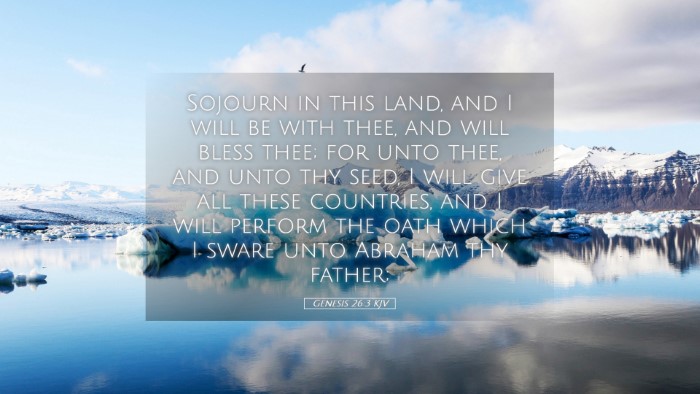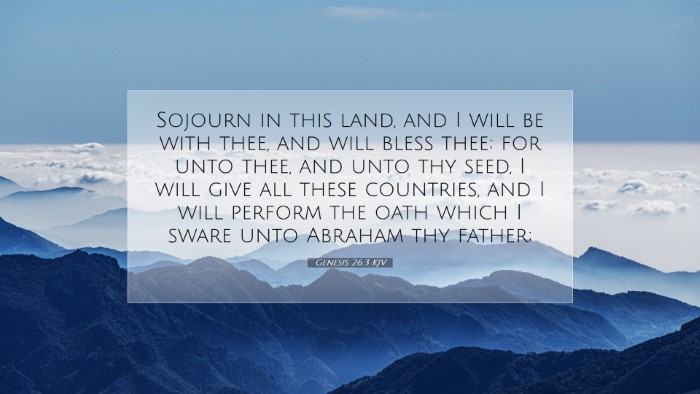Commentary on Genesis 26:3
Verse: "Sojourn in this land, and I will be with thee, and will bless thee; for unto thee, and unto thy seed, I will give all these countries, and I will perform the oath which I sware unto Abraham thy father." (Genesis 26:3)
Introduction
This verse marks a significant moment in the life of Isaac, Abraham's son, where God reaffirms the covenant made with Abraham. This narrative underscores themes of trust, divine provision, and the continuing unfolding of God’s redemptive plan through the patriarchs.
Divine Assurance
Matthew Henry emphasizes that God's command to Isaac to sojourn in the land illustrates the principle of divine guidance. God instructs Isaac not to leave the land of Gerar, assuring him of His presence. The promise "I will be with thee" is a profound reminder of God’s continual support for His people during their challenges.
Albert Barnes echoes this sentiment, highlighting how God's presence is a source of comfort and strength. He notes that God's declaration of "I will bless thee" signifies not merely financial or material blessings, but encompasses spiritual well-being and security.
The Covenant Renewed
God's promise to Isaac concerning his descendants reiterates the importance of the Abrahamic covenant. Adam Clarke points out that the covenant was not just a historical event but a living promise that carried on to Isaac, reminding readers of God’s faithfulness through generations.
This verse serves to reassure Isaac amidst potential uncertainties, affirming that God's plans are not thwarted by time or circumstances. It invites reflection on how God often uses ordinary events to fulfill extraordinary promises.
The Geography of Promise
The instruction for Isaac to dwell in the land of Gerar is significant. Matthew Henry interprets this as God’s provision for Isaac during a period of famine, contrasting with the earlier narrative of Abraham, who went to Egypt during a similar situation. This illustrates God’s desire for His people to remain rooted in the places He designates for them, involving both physical and spiritual dimensions.
Moreover, Albert Barnes mentions that the phrase "all these countries" reflects the broad scope of the promise. This indicates that God’s blessings are not limited to one individual but extend to the wider community that forms through the lineage of Isaac.
Faithful Obedience
Isaac’s obedience to God’s command to remain underscores a vital principle in the Christian walk—trusting in God's plan even when circumstances seem dire. Adam Clarke suggests that Isaac's staying in Gerar, a region of potential hostility, is a testament of his faith in God’s promise of protection and blessing.
Faithful obedience often includes recognizing God’s direction amidst life's uncertainty. This affirmation to Isaac is a prelude to future events, which showcase God’s providence even in strenuous times.
Theological Implications
Genesis 26:3 encapsulates profound theological implications about God’s character. The assurance of presence, blessings, and fulfillment of promises reveals a God who is both immanent and transcendent—present in the lives of His people yet sovereign over the history of nations.
Matthew Henry suggests that believers today should take comfort in the same promises; that God remains with His people and blesses them as they remain faithful. This reassurance encourages engagement in mission and community building based on God’s overarching covenantal faithfulness.
Application for Today's Believers
For pastors and theologians, this verse provides ample material for preaching about God’s faithfulness and the importance of obedience in faith. Albert Barnes encourages believers to reflect on their 'sojourning'—the places and situations in which God has planted them and how they can be a blessing to those around them.
The radical faith exhibited in Isaac's life invites contemporary believers to engage with their culture while trusting God's provision and guidance. Emphasis on prayerful discernment and maintaining proximity to God’s promises remains essential in today’s context, echoing Isaac’s experience.
Conclusion
Genesis 26:3 encapsulates a pivotal moment that intertwines themes of promise, presence, and purpose. The commentary from esteemed theologians like Matthew Henry, Albert Barnes, and Adam Clarke provides rich insights that challenge and encourage modern believers. As Isaac experienced God’s faithfulness, so too can today’s followers draw strength from the understanding that God is with them and will fulfill His promises in His time and manner.


